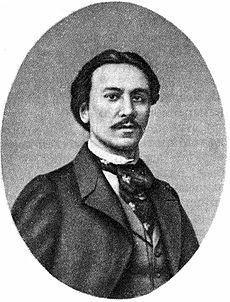Vsevolod Krestovsky
Vsevolod Krestovsky | |
|---|---|
 | |
| Born | February 23, 1840 Kiev Governorate, Russian Empire |
| Died | January 30, 1895 (aged 54) Warsaw, Poland |
Vsevolod Vladimirovich Krestovsky (Russian: Все́волод Влади́мирович Кресто́вский; February 23, 1840 – January 30, 1895) was a Russian writer who worked in the city mysteries genre.
Biography
Krestovsky came from an old family of Polish gentry (szlachta) with roots in nowadays Ukraine. In 1857 he enrolled in the Historico-Philological faculty of St Petersburg University. At the University he became friends with the radical critic Dmitry Pisarev, and wrote for the magazine Russian Word.[1][2]
After his short association with the radical camp, he joined a group of moderate slavophiles which included Apollon Maykov, Lev Mei and others, and began publishing his works in Notes of the Fatherland, Time and Epoch. In 1860 he left the University to become a professional writer. His novel The Slums of Saint Petersburg (1864), a product of many hours of personal observation, gained him considerable popularity.[1][2]
In 1863 he traveled to Warsaw to take notes for his novel The Flock of Panurge (1869), about the January Uprising. In 1874 he wrote another novel, The Force, on the same subject. Both novels were reactionary in nature. In the 1880s Krestovsky became frankly and openly anti-Semitic in his political and social views. His blatantly anti-Semitic trilogy The Jews are Coming was published between 1888 and 1892. He died in Warsaw in 1895.[1][2]
English translations
- Knights of Industry, from Mystery Tales, The Continental Classics, Volume 17, Harper and Brothers, NY and London, 1909. from Archive.org
References
- ^ a b c Terras, Victor (1990). Handbook of Russian Literature. Yale University Press. pp. 234–235. ISBN 0300048688. Retrieved June 28, 2012.
- ^ a b c "The Great Soviet Encyclopedia". The Gale Group. Retrieved June 28, 2012.
External links
- Works by or about Vsevolod Krestovsky at the Internet Archive
- Works by Vsevolod Krestovsky at LibriVox (public domain audiobooks)

- 1840 births
- 1895 deaths
- People from Kiev Governorate
- Russian male novelists
- Russian dramatists and playwrights
- Russian male dramatists and playwrights
- Russian male short story writers
- Saint Petersburg State University alumni
- Ukrainian writers
- Slavophiles
- Russian nationalists
- 19th-century Russian novelists
- 19th-century Russian dramatists and playwrights
- 19th-century Russian short story writers
- 19th-century Polish male writers
